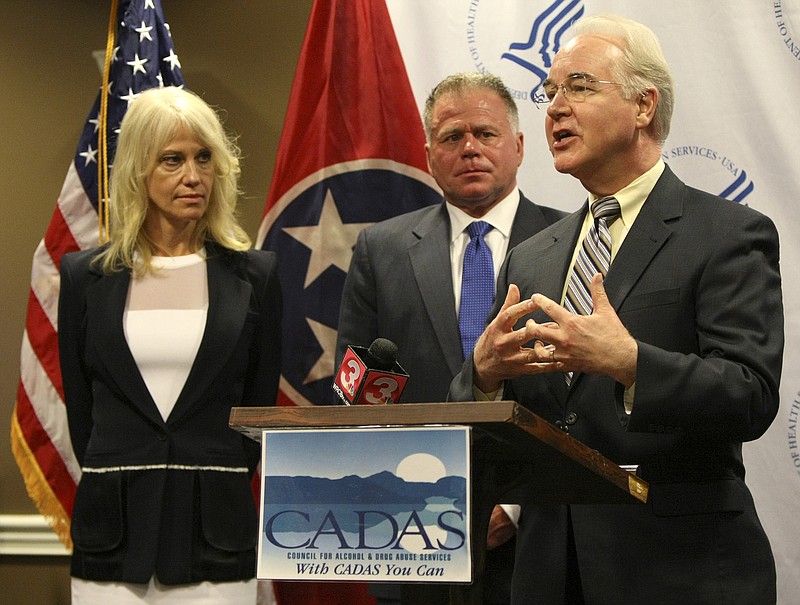The opioid crisis that claims more than 50,000 American lives a year "is a scourge that knows no bounds" and will require more spending and more oversight of how drugs are prescribed and sold, U.S. Health and Human Services Secretary Tom Price said Thursday.
But after touring a drug treatment facility in Chattanooga, Price, who is a physician, said money alone won't solve the epidemic and prosecutors won't be able to solve the opioid crisis simply by locking up every offender. During Thursday's visit with state and local health officials and those getting drug treatment, Price said a multifaceted approach is needed by the private, faith and government communities at all levels to reverse the rising number of opioid deaths in America.
"With the president's incredible support and commitment to solving this challenge, we have made the opioid crisis one of our top three medical priorities in our department," Price said.
In 2015, the most recent year for which figures are available, more than 52,000 Americans died from opioid overdoses or related problems in the United States, including nearly 1,500 in Tennessee, which has the fifth highest rate of opioid use and abuse, Price said.
Gov. Bill Haslam said drug addiction is a barrier to economic growth, educational attainment and the overall health of Tennessee. The annual cost of the epidemic is estimated to be $78.5 billion, and every day, an average of 78 Americans die from opioid abuse.
Haslam said the opioid epidemic "doesn't know politics and doesn't know prejudice," since nearly all segments of society have been touched by addictions and the fatalities, family disruption and crimes that it breeds.
"I think the challenge that almost supersedes anything else we are dealing with in Tennessee is this scourge of drug addition, especially what we are seeing around opioids right now," Haslam said. "It's one of the most limiting factors when it comes to economic development, and it's definitely one of the most limiting factors in our big goal of having an increased share of our population that has a college degree."
Haslam hosted Price and White House adviser Kellyanne Conway on Thursday as they toured and heard from those at the North Shore clinic operated by CADAS, or the Council for Alcohol & Drug Abuse Services, one of the state's biggest nonprofit agencies providing a full continuum of drug treatment and rehabilitation.
"This is a crisis that has left no state unspared and no demographic group untouched." Conway said. "We're facing a non-partisan issue that is in desperate need of a bi-partisan solution."
But as U.S. senators debate during their July recess whether to repeal and how to replace the Affordable Care Act, or Obamacare, the partisan divide was clear over how to sustain drug treatment.
Democratic critics of the Senate and House efforts to overturn Obamacare claim the GOP reform plans could trim federal Medicaid spending that pays for many low-income people to get drug treatment and, if states decide to do so, could weaken the mandate in Obamacare for insurers to cover drug treatment as an essential service.
The Congressional Budget Office estimates that the changes would lead to a reduction in spending on Medicaid of more than $800 billion over a decade, although the Senate draft version pushes off most of the changes for at least a couple of more years.
Mary Mancini, chairwoman of the Tennessee Democratic Party, said Thursday that Price "is doubling down on the misleading claims" and suggested that Medicaid cuts could trim funding for drug treatment.
"The insurers that are required to cover substance abuse treatment by the Affordable Care Act also will likely be exempted, leaving more people without access to treatment," she said. "This bill will make it harder to get treatment for addiction and more people will die, plain and simple."
But Price insisted the Trump administration is committed to fighting the opioid epidemic.
"The president is absolutely resolute to make sure that every American has access to coverage and treatment that they need - whether it is through the Medicaid system, the Veterans Administration, employer-sponsored plans or individual coverage," Price said. "Whatever happens, we are strongly supportive of making sure that individuals have that kind of coverage."
The federal government is already pumping more money into local projects under the 21st Century Cures Act adopted by the GOP-controlled Congress. Under the act, Tennessee is getting an additional $13.8 million in the new fiscal year that began Friday, and the state of Tennessee has allocated more than $6 million of state funds to match the federal dollars to support local treatment programs, including those offered by CADAS in Chattanooga.
Mallie Moore, a recovering opioid addict and mother of three, credited CADAS and other drug treatment programs for helping her to stay sober for the past three years and to begin to rebuild her family. She said when she was using drugs, "the disease meant my focus wasn't on my children but on my next fix."
She said CADAS taught her there is another and better way to live.
"In Washington, we believe those who are closest to the situation know best how to deal with a problem and allocate resources," Price said.
Senate Majority Leader Mitch McConnell tried to sweeten the pot last week to gain more support for his plan to repeal and replace Obamacare by increasing funding for such opioid addiction programs to $45 billion after the original version of the bill only allocated $2 billion.
"The conversation that is going on right now in the United States Senate as it relates to health reform and moving in a better direction is to provide more resources for the opioid crisis," Price said during his Chattanooga visit. "Resources are absolutely imperative for solving this issue, but they are not the only thing. We want to make sure that the monies we provide are used in a way that makes sure that the greatest number of individuals realize recovery and move into an addiction recovery."
Trump has appointed a White House commission chaired by New Jersey Gov. Chris Christie to examine the drug addiction problem in the country to develop more ways to address the problem.
"We recognize that this takes resources and that begins with money," Conway said. "But it also takes heart to help de-stigmatize addiction so people feel free to come forward and get help without shame."
Circuit Court Judge Duane Slone from Tennessee's Jefferson County, a former prosecutor who helped convict more than 400 drug offenders in the 1990s, said he has come to realize the benefits of treatment and drug recovery programs.
"We need law enforcement, but it's a little like pouring water on a forest fire," said Slone, who has pushed for drug courts and rehabilitation programs for those with drug addictions. "The way to win the war on drugs is in the demand side."
Contact Dave Flessner at dflessner@timesfreepress.com or at 423-757-6340.

